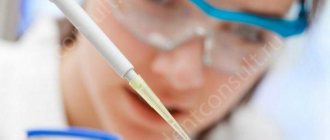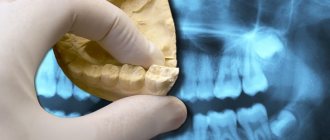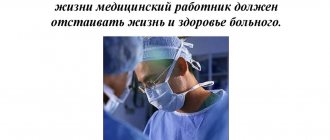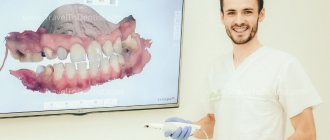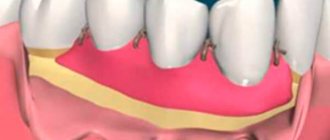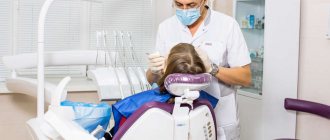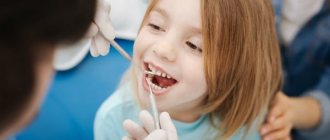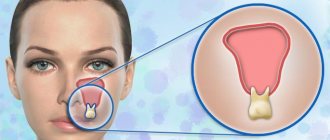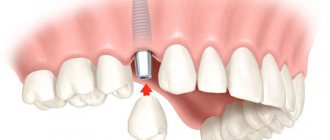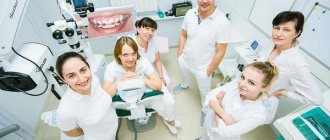What does a periodontist do?
A periodontist treats gum inflammation, i.e. mucous membrane and soft tissues that surround and support teeth. Teeth and gums form a single system, and without healthy gums there are no healthy teeth. The periodontist treats stomatitis (inflammation of the mucous membrane), gingivitis (inflammation of the gums), periodontitis (gingivitis turns into it if left untreated), etc.
We suggest you read: How to quickly remove anesthesia after a dentist
The most unpleasant disease of this kind is periodontal disease. It occurs when an infection enters the space between the tooth and gum. Pain in the gums and bad breath are the most harmless things it leads to. Over time, due to periodontal disease, teeth no longer stay in their sockets, become loose and fall out.
Departments
The Faculty of Dentistry includes 8 departments:
— Department of Therapeutic Dentistry (Head of the Department, Associate Professor, Doctor of Medical Sciences Yu.G. Tarasova),
— Department of Orthopedic Dentistry (Head of the Department, Professor, Doctor of Medical Sciences I.S. Redinov),
— Department of Pediatric Dentistry, Orthodontics and Prevention of Dental Diseases (Head of the Department, Associate Professor, Doctor of Medical Sciences R.R. Shakirova)
— Department of Surgical Dentistry and Maxillofacial Surgery (head of the department, associate professor, candidate of medical sciences S.B. Mokhnacheva).
— Department of Microbiology and Virology (Head of the Department, Doctor of Medical Sciences M.K. Ivanova),
— Department of Ophthalmology (head of the department, Doctor of Medical Sciences V.A. Korepanov),
- Department of Faculty Therapy with courses in endocrinology and hematology (head of the department, professor, doctor of medical sciences Yu.V. Gorbunov),
- Department of Medical Biophysics, Informatics and Economics (head of the department, Ph.D. in Economics, Associate Professor N.P. Penkin).
What does an orthopedic dentist do?
An orthopedic dentist is a specialist in prosthetics. Abbreviated as prosthetist. When the dentist-therapist has carried out the treatment and has exhausted all possibilities to restore the tooth with his own means, he refers the patient to a prosthetist. He, having a good understanding of the biomechanics of the dental system, offers the patient options for prosthetics.
Takes impressions of teeth, on the basis of which the dental technician prepares dentures. Then the doctor tries on, adjusts and finally secures them in the patient’s mouth. Today, an orthopedic dentist has many prosthetic options at his disposal – from crowns, bridges and inlays to implants. Removable dentures are also used. But with the development of technology, these inconvenient designs will gradually become a thing of the past.
About the faculty
The faculty trains specialists who, upon completion, can work as a dentist, dentistry teachers in medical schools and colleges, and dental researchers.
Full-time form of education. Duration of training: 5 years. The training of specialists is carried out in accordance with the Federal State Educational Standard of Higher Education (FSES 3) in the specialty 05/31/03 “Dentistry”, the level of higher education “Specialty”, approved by the Ministry of Education and Science of Russia on 02/09/2016.
To date, 425 students are studying at the faculty.
The teaching staff of the Faculty of Dentistry has significant scientific and pedagogical experience using modern support for the educational process. The faculty departments are taught by: 9 professors, 22 associate professors, 17 assistants, 3 senior teachers. Of these, 47 have an academic degree, including 11 doctors, 30 candidates of medical sciences, 2 candidates of pedagogical sciences, 2 candidates of economic sciences, 2 candidates of biological sciences. All teachers regularly undergo advanced training courses at central bases and on-site cycles and improve their teaching qualifications.
The emergence of new technologies in dentistry and high competition in the dental services market dictate the need to train specialists with deep knowledge, clinical thinking and excellent manual skills. Today, the process of teaching students at the faculty is built on the principles of continuity and at each level a form of student activity that is close to the professional activity of a doctor is consistently modeled. At the first stage, students become familiar with the work of a dentist and master the basics of the specialty using phantoms. Today, the Faculty of Dentistry has a phantom classroom equipped with 24 tabletop turbine drills.
All conditions have been created for the gradual development of manual skills and the participation of students in independent clinical examination of patients. The Faculty of Dentistry has its own clinical base - the IGMA dental clinic, equipped taking into account all modern trends in dentistry. Also, the clinical bases of the faculty under contracts are the largest, leading medical, preventive and dental institutions of the Udmurt Republic and the city of Izhevsk, such as: BUZ "1 RKB MH UR", BUZ "RKDB MH UR", BUZ "GKB No. 6 MH UR", BUZ "GB No. 4 MZ UR", BUZ "Dental Clinic No. 3 of Izhevsk MH UR", Children's Clinical Dental Clinic No. 2, Republican Infectious Clinical Hospital, Republican Dental Clinic, BUZ "Dental Clinic No. 2 of Izhevsk MH UR" .
Work with students is also carried out in student scientific circles, which are organized in all departments of the faculty. Students involved in clubs make presentations at scientific conferences, including abroad, and publish the results of their scientific work. The opportunity to learn modern technologies allows students to participate in All-Russian Dentistry Olympiads.
Students of the Faculty of Dentistry not only successfully study, but also engage in amateur artistic activities, sports and tourism. Student government bodies and the trade union committee of IGMA students actively participate in the social and cultural life of the academy.
After completing the 5th year, students, having passed the last state exams and received a medical diploma, continue postgraduate training in clinical residency at the main specialized departments of the academy under the guidance of the teaching staff. After graduating from the faculty, graduates can also continue their professional and scientific training in graduate school and clinical residency, as well as specialize in narrow specialties: dental surgeon, maxillofacial surgery, dental therapist, orthopedic dentist, orthodontist, pediatric dentist.
Where to study
There are quite a few universities in Russia that teach dentists. Sometimes medical faculties are opened in non-specialized universities (for example, in St. Petersburg State University, RUDN University, BelSU), but traditionally schoolchildren strive to get into specialized educational institutions - medical institutes with a rich history. When choosing where to study to become a dentist, pay attention to the following universities:
- First Medical University named after. I. M. Sechenov;
- Moscow State Medical and Dental University named after. A. I. Evdokimova;
- Tyumen State Medical University;
- Ryazan State Medical University named after Academician I. P. Pavlov;
- Krasnoyarsk State Medical University named after. Professor V.F. Voino-Yasenetsky;
- Russian National Research Medical University named after. N. I. Pirogova;
- Penza State University;
- Volgograd State Medical University;
- Kursk State Medical University;
- Kazan State Medical University.
We suggest you read What to do if your tongue hurts: causes and methods of treatment
Competition for the budget of dental faculties in medical universities in Russia - 5-10 people for each of 30-40 places. Therefore, some applicants immediately consider options for paid education. Its cost ranges from 150 to 350 thousand rubles per year.
The best medical universities in the world
If you are planning a foreign career as a doctor, it is better to think about enrolling in another country. Domestic diplomas must be confirmed in a special way before being allowed to work. These TOP 10 universities are considered the best for young doctors. To get there you need to put in a lot of effort and perseverance.
Harvard University
Harvard is suitable for those who want to receive a modern medical education, taking into account international experience. For those who see themselves in pharmacology and other related sciences.
Available specialties:
Medical business.
The division into specialties differs from the Russian one. In America, the diploma does not specify any specialty. At the time of graduation, you simply become a Bachelor of Science in Nursing.
How to proceed
To get into Harvard Medical School, you need to write a motivation letter and talk about your achievements in science and other areas of activity. You must also send to the university a copy of your school certificate, the results of the language exam, two recommendations from teachers, and an application in the prescribed form. There is a fee of $75, but it can be waived if you provide proof of low income. Some applicants are given an interview.
How the training works
Harvard has a whole system of teaching hospitals. There, students undergo continuous practice under the guidance of real doctors. At the same time, there are many offers for students not related to the main specialty, since training at Harvard Medical School is based on the Liberal Arts .
Oxford University
Lectures at Oxford are given by leading professors of medicine from around the world. This is what ensures high competition for one vacant position.
Available specialties:
Medical business.
How to proceed
In Britain itself they approach preparation for Oxford very responsibly; children study in special classes from the age of 12-13. But you can also try to submit documents from another country. You need to write an essay on a given topic or pass a test, which is compiled by the university itself. English exam results are attached to them. Admission takes place through the UCAS portal common to all UK universities. Application costs £60.
How the training works
The Basic Medicine course is designed for students who want to understand the scientific research behind modern medicine. A lot of effort is also expended on clinical practice in one's own system of hospitals and clinics, but one moves on to it only after receiving a bachelor's degree.
Advantages and disadvantages of the profession.
Like any other, the dental profession has its advantages and disadvantages, which should be carefully studied before entering. Studying and then working in dentistry requires great emotional, physical, and sometimes material costs, so it is better to avoid mistakes when choosing this activity.
Advantages:
- High demand for specialists in the labor market
- Decent salary
- Various options for professional development (medical, scientific career, own business, etc.)
- Prestige and respectability
- Satisfying the desire to be useful, to help people, to see the results of one’s work
- Possibility of self-realization, creative component
Flaws:
- Difficulty in applying for government-funded places due to high competition, high tuition fees
- Long-term training and regular professional development
- High emotional and physical stress
- Occupational diseases (osteochondrosis of the cervical vertebrae, etc.)
- Long working hours (especially at the beginning of a career).
- Work without room for error
Entrance exams
There is no need to take exams for medical colleges and schools: students are recruited through a certificate competition. Universities take into account the results of passing the Unified State Exam. For certain categories of applicants, dental universities organize their own entrance tests. We are talking about foreign citizens, people with disabilities, as well as graduates of technical schools, colleges and schools. If they wish, they have the right to take internal university exams without providing USE results.
The passing scores for a budget place at any dental institute are different every year and depend on how well the applicants passed the Unified State Exam and how many excellent students decide to enroll in a particular university. In the last few years the level has been high - an average of 80-90 in each subject. The competition for paid education is lower: as a rule, it is enough to score 60-65 points on the Unified State Examination. Winners of Olympiads from the List of the Ministry of Education and Science in specialized disciplines (chemistry and biology) enjoy an advantage in admission and can enter the ranks of students without competition.
General dentist
Many modern dentists go beyond narrow specialties. For example, a dental therapist can treat gums, i.e. perform the functions of a periodontist. General dentists are especially in demand in private clinics, because such a doctor can independently examine a patient, make a diagnosis, draw up a treatment plan and carry it out.
We invite you to familiarize yourself with Toothpastes for restoring enamel
However, it is impossible to master all the listed specialties equally, so clinics cannot completely abandon specialized specialists. For example, general dentists do not usually do prosthetics. But there are exceptions: a doctor in a private dental office can combine treatment and prosthetics.
